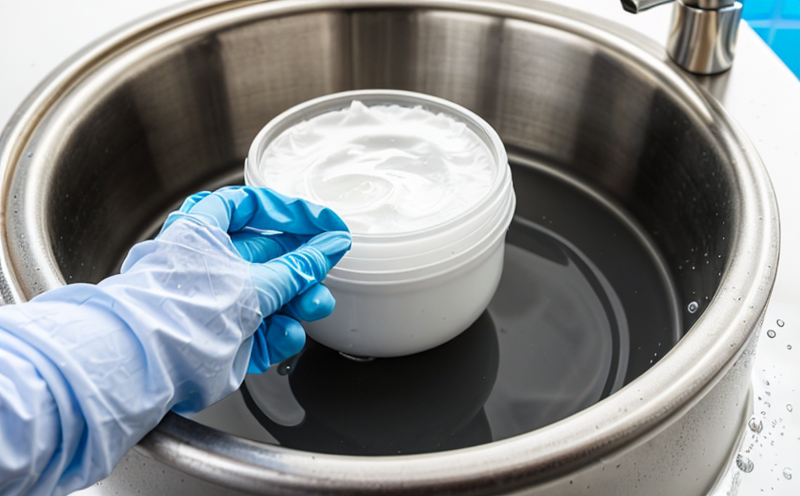Animal Feed Surfactant Testing
The testing of surfactants in animal feed is a critical component of ensuring food safety and quality. Surfactants play a vital role in enhancing palatability, improving nutrient absorption, and optimizing the overall efficiency of feeds. This service ensures that surfactants meet regulatory standards and do not pose any risks to livestock health or end-product safety.
Our laboratory specializes in providing comprehensive testing services for surfactants used in animal feed formulations. We utilize advanced analytical techniques and adhere strictly to international standards such as ISO, ASTM, EN, IEC, and other relevant guidelines. Our team of experts ensures that every test is conducted with precision and accuracy to deliver reliable results.
Animal feed surfactants undergo rigorous testing covering a wide range of parameters including solubility, emulsifying power, foaming properties, biodegradability, and toxicity assessments. These tests help in validating the surfactant's performance within the feed matrix while ensuring it does not interfere with other components.
The process begins with thorough sample preparation where the surfactants are introduced into a controlled laboratory environment designed to simulate real-world conditions. This includes varying temperature ranges, humidity levels, and pH adjustments relevant to different animal species.
Our state-of-the-art analytical equipment allows us to measure minute quantities of surfactants accurately. We use high-performance liquid chromatography (HPLC), gas chromatography-mass spectrometry (GC-MS), Fourier transform infrared spectroscopy (FTIR), and other cutting-edge technologies to analyze the chemical composition and physical properties of the surfactants.
The testing process involves multiple steps, from initial screening for impurities and contaminants to detailed performance evaluation. For instance, emulsifying power is assessed by measuring how effectively the surfactant stabilizes oil-in-water or water-in-oil systems under controlled conditions. Foaming properties are evaluated through foam stability tests which simulate the operational environment of feed processing.
Biodegradability testing is conducted to ensure that any residues from the surfactants do not persist in the environment, thereby contributing to sustainable farming practices. Toxicity assessments follow strict protocols outlined by regulatory bodies to determine if there are any harmful effects on livestock health and productivity.
The results of these tests are meticulously documented and reported according to industry best practices. Our reports provide detailed insights into the performance of surfactants in different scenarios, helping manufacturers make informed decisions about product formulation and quality control measures.
By leveraging our expertise in chemical testing, we ensure that surfactants used in animal feed meet stringent safety and efficacy standards. This not only enhances the nutritional value of feeds but also promotes healthier livestock populations, contributing positively to global food security.
Industry Applications
| Sector | Application |
|---|---|
| Poultry Feed Manufacturing | Improving feed palatability and nutrient absorption in poultry feeds. |
| Cattle Feeding | Enhancing the efficiency of cattle diets by optimizing feed formulation. |
| Swine Nutrition | Sustaining optimal health and growth rates through balanced dietary surfactants. |
| Ruminant Feed Formulation | Promoting better digestion and utilization of ruminant feeds. |
| Companion Animal Diets | Ensuring palatability and bioavailability in pet food products. |
The use of surfactants in animal feed is widespread across various sectors, each requiring specific testing protocols tailored to its unique needs. Our laboratory caters to the diverse requirements of these industries by offering customized testing solutions that ensure compliance with international standards and promote sustainable agricultural practices.
Quality and Reliability Assurance
We understand the importance of maintaining consistent quality in surfactant testing for animal feed. Our laboratory is equipped with ISO/IEC 17025-accredited facilities, ensuring that all tests are conducted under stringent quality control measures. This accreditation guarantees that our results are reliable and can be trusted by industry stakeholders.
Our team of qualified professionals adheres to strict protocols throughout the testing process, from sample preparation to final analysis. We employ rigorous quality assurance procedures at every stage to minimize errors and ensure accuracy. This commitment to excellence is reflected in our consistently high-quality reports, which provide clear insights into surfactant performance.
In addition to laboratory-based tests, we also offer field validation services where necessary. These additional checks help validate the results obtained from controlled lab environments against real-world conditions, providing a more comprehensive understanding of how surfactants behave under different circumstances.
Our continuous efforts in maintaining top-tier quality standards are backed by extensive training programs for our staff and regular updates on new methodologies and technologies. By staying ahead of industry trends, we ensure that our services remain relevant and effective in meeting current and future needs.
Environmental and Sustainability Contributions
- Promoting sustainable farming practices by ensuring surfactants do not accumulate in the environment.
- Supporting circular economy principles through efficient resource utilization during testing processes.
- Reducing waste generation by optimizing sample preparation methods without compromising accuracy.
- Encouraging responsible sourcing of raw materials used in surfactant production.
The environmental impact of surfactants is a growing concern, especially within the agricultural sector. Our laboratory contributes to sustainability efforts by implementing environmentally friendly testing protocols that minimize waste and resource consumption. We also advocate for sustainable practices throughout the supply chain, from raw material selection to final product delivery.
By adhering to strict environmental guidelines and continuously seeking ways to reduce our carbon footprint, we aim to contribute positively to global sustainability goals while maintaining robust quality standards in surfactant testing.





